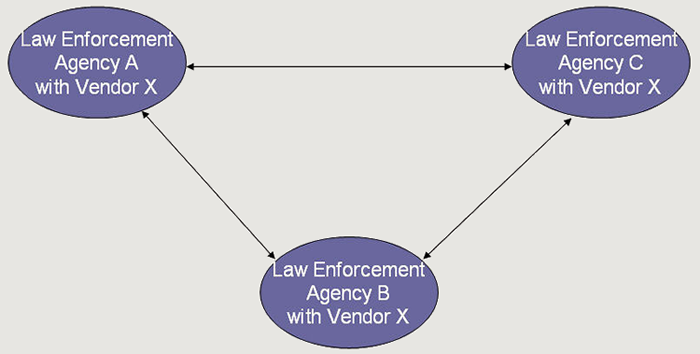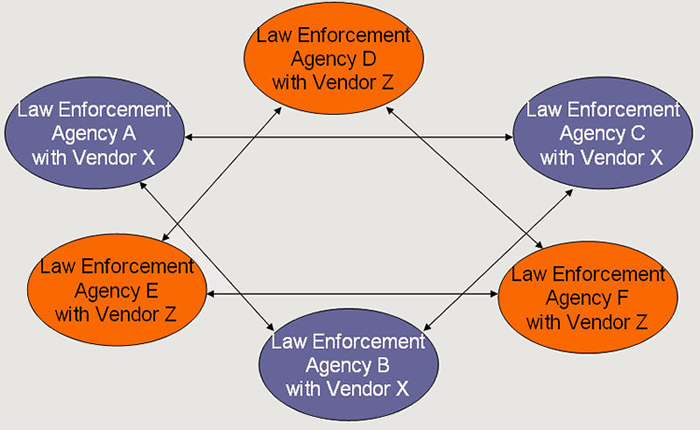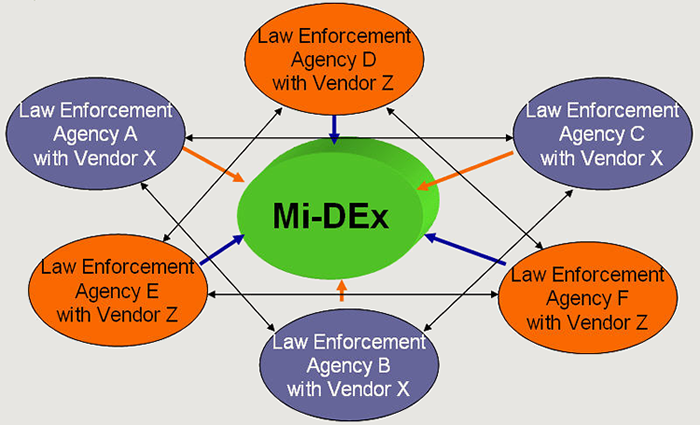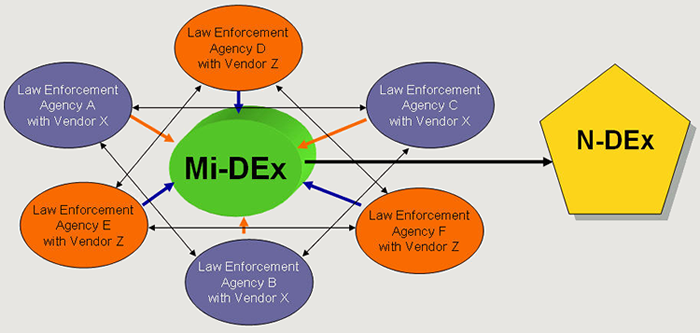

Mi-DEx is the Michigan initiative for jointly sharing law enforcement information. The Michigan State Police, Michigan Association of Chiefs of Police, and the Michigan Sheriffs’ Association endorse the concept of electronically sharing information that is beneficial to law enforcement investigations, such as incident reports and jail management data. Together, they have created the Mi-DEx initiative to further this goal.
Mi-DEx will build on the efforts of those agencies that have taken the lead in creating on-line information sharing collaboratives across the state. There are many of these collaboratives including the Western Michigan project Ignite and the Saginaw Bay area ARMS system. Mi-DEx is the “glue” that ties these collaboratives together into a state-wide information sharing system. Mi-DEx will provide a means whereby Michigan agency data can be forwarded for inclusion in the N-DEx system. Further, it will make it possible to share information nation-wide through N-DEx.
N-DEx, created by the FBI, is already functional with many states and localities participating. It provides crime mapping and analytical capability for crime solving and investigation. Agencies can access N-DEx through their LEEP (law enforcement enterprise portal) account. Access to N-DEx is free of charge. Go to https://www.fbi.gov/services/cjis/ndex for more information.
The Mi-DEx interface with N-DEx does not require that Michigan store information at the state level. Mi-DEx will simply consolidate information for passing on to N-DEx in a single nightly feed. The state is simply a pass-through. Each agency chooses which information it wants to submit. An entire Michigan information sharing collaborative can choose to submit their data collectively to Mi-DEx, or a single agency can contribute data on its own.
Unlike Michigan ’s Mi-DEx, N-DEx is a central repository of incident, arrest and other data. Agencies choose the type and amount of data they wish to contribute. The data they include in the Mi-DEx interface will be passed through to N-DEx. Agencies should only send data that is categorized as “green” or non-secure incident and arrest data. All law enforcement nationwide that have access to N-DEx will be able to access this data as part of any N-DEx crime analysis or mapping inquiry.
The State, as the data submitter to N-DEx, has signed a Memorandum of Understanding with N-DEx agreeing to abide by common use and dissemination principles. All agencies that choose to participate in Mi-DEx will be required to sign a Mi-DEx MOU. The Mi-DEx MOU is based on the N-DEx MOU’s common use and dissemination principles. Execution of the Mi-DEx MOU by all participating agencies will ensure agreement between Mi-DEx participants and preserve the integrity of the system.
Here is an illustration of how Mi-DEx works.

Regional collaboratives may already exist and share records among law enforcement agencies. Usually these collaboratives all use the same records management vendor. This vendor has networked the agencies’ data bases together and has provided a screen whereby agencies can query information and get results such as searches on names, maps of crimes, etc.

These collaboratives provide useful information sharing within the region, but participating agencies cannot share information with other agencies that are outside their collaborative. For example, Agencies A, B, and C all use Vender X and share easily among themselves. Likewise, Agencies D, E, and F all can share among themselves through their Vendor X. But Agency A cannot share data with Agency F. They have a different vendor and there is no statewide mechanism to assist with sharing among disparate systems.

The solution is a statewide information sharing infrastructure. This is called Mi-DEx. It provides a way for agencies and/or their vendors to extract data from their records management systems to be shared by all. This can either be done within a collaborative with the vendor’s help in opening up the collaborative’s data to Mi-DEx by sending a single nightly feed to Mi-DEx. Or, a single agency that is not a member of a collaborative can participate. A single agency can do this by performing some computer programming in-house or hiring a vendor to extract data from its records management system.
Mi-DEx does not store the data. It is simply a pass through.
Each agency controls what data it wants to share.

Mi-DEx simply provides a pipeline to transmit all Michigan participating agencies’ data to N-DEx, the National Data Exchange. It transforms disparate vendor data into standard computer language. Mi-DEx data is sent to N-DEx in a single nightly feed. Data is stored in a central database at N-DEx but, again, an agency can choose which data it wants to share.
Through N-DEx, agencies can search, link, analyze and share data nationally. N-DEx provides a query tool to perform searches and crime mapping. Jurisdictions from 40 states and 5 federal agencies are already participating. A participating Michigan agency will have access to all of this national data in addition to the data of all the other Michigan agencies that are participating. Access is free and is granted and controlled through the FBI’s Law Enforcement Enterprise Portal (LEEP). Use and dissemination of the data is controlled by a user agreement.